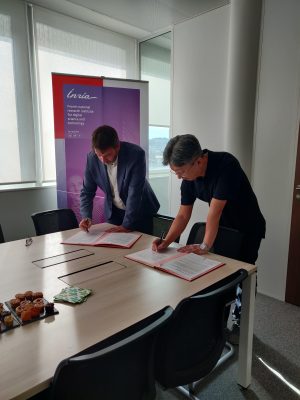Articulab starts new project with Korean Partners
2022.September.19:
“Adaptive Personality for Intelligent Agents” is a large interdisciplinary project involving the ArticuLab at Inria and a number of research organizations in Korea, that is starting this year. It aims to increase our understanding of how humans and machines relate to one another interpersonally, while involved in spoken interaction, and how the interplay of participants’ personalities contributes to interaction progress. The project will result in a new generation of intelligent agents, capable of relating to us humans on our terms – by understanding far more than the words we say.
The project includes a number of partners in Korea, each contributing expertise to this interdisciplinary project. Our main partner is the Korean Electronics Technology Institute (KETI), based in Seoul. The consortium further includes three academic institutions, an AI company, and a distinguished psychiatrist to provide insights into how best our models and agents can be applied.
Our part of the research is concentrating on detection and understanding of the bundle of multimodal signals which we humans constantly assess during spoken interaction. These range from the language we use, visual signals such as posture, gesture and facial expressions, and acoustic features and nonverbal signals present in our voices, such as tone of voice, laughter, speech rate and pausing. We process all of these signals to understand both the intended linguistic message and also our interlocutors’ attitudes, feelings and personalities.
In terms of personality, the bulk of work to date in human-computer interaction has focused on understanding the human user’s personality as a static immutable aspect of a person, even although it is widely accepted that we present different ‘personas’ in different contexts in our daily lives. Our aim is to take into account our public personas and our private or ‘true’ selves, and also, radically, to understand how the interplay of participants’ personalities affect how conversation progresses.

Our cross continent partnership will also allow us to examine the role cultural factors play in expression of personality in different contexts, and we hope to carry out cross-cultural studies to deepen our understanding of this area.
Most fundamentally, we plan to use this research to inform a more comprehensive cognitive science theory of how the presence and interaction of personality factors of individuals affect interaction. We term this phenomenon ‘interpersonality’. We will then employ this theory to monitor and improve human-agent collaboration. Finally, we will develop new metrics to assess the success of agents with this capability, where the aim of interaction is not simply to inform or perform simple tasks, but also to relate to the user, fostering fruitful conselling, educational and therapeutic encounters.
This project follows on from our successful four year collaboration with KETI (2016-2020) on conversational rapport in AI companions. In that project we worked towards creating AI companions that understood more than just words, and could use their understanding of both language and a wide range of nonverbal behaviours to truly fit into people’s worlds. This project is a natural next step and will take the work accomplished in our previous collaboration much further.
The Inria team is led by Justine Cassell, and includes Emer Gilmartin, a postdoctoral researcher, four PhD students working in the area of human computer interaction and dialogue systems, and a number of interns. We have already started work on the project, with a recent visit from Dr Hyedong Jong to Inria Paris, and are planning a formal launch with the President of KETI in the new year.
- January 2025
- May 2024
- February 2024
- August 2023
- September 2022
- March 2022
- September 2018
- August 2018
- July 2018
- June 2018
- May 2018
- April 2018
- March 2018
- February 2018
- November 2017
- October 2017
- August 2017
- July 2017
- June 2017
- May 2017
- March 2017
- February 2017
- January 2017
- October 2016
- September 2016
- August 2016





